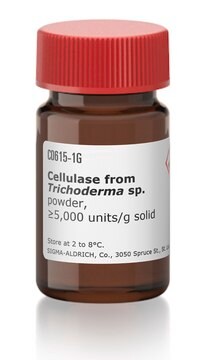P2401
Pectinase from Rhizopus sp.
powder, 400-800 units/g solid
Synonym(s):
Macerozyme R-10, Poly-(1,4-α-D-galacturonide) glycanohydrolase, Polygalacturonase
About This Item
Recommended Products
form
powder
Quality Level
specific activity
400-800 units/g solid
greener alternative product characteristics
Waste Prevention
Design for Energy Efficiency
Learn more about the Principles of Green Chemistry.
sustainability
Greener Alternative Product
greener alternative category
, Enabling
storage temp.
−20°C
Looking for similar products? Visit Product Comparison Guide
General description
Pectinase, also known as pectinolytic enzyme, is predominantly found in bacteria, fungi and plants. Polygalacturonase is one of the highly abundant enzymes among all the pectinolytic enzymes. Pectinase has a wide range of industrial applications including, fruit juice extraction and its clarification. In addition, it is also used in vegetable oil extraction, tea and coffee fermentations, bleaching of paper, in poultry feed additives and in alcoholic beverages and food industries.
Application
Biochem/physiol Actions
Unit Definition
Other Notes
Signal Word
Danger
Hazard Statements
Precautionary Statements
Hazard Classifications
Resp. Sens. 1
Storage Class Code
11 - Combustible Solids
WGK
WGK 3
Flash Point(F)
Not applicable
Flash Point(C)
Not applicable
Personal Protective Equipment
Certificates of Analysis (COA)
Search for Certificates of Analysis (COA) by entering the products Lot/Batch Number. Lot and Batch Numbers can be found on a product’s label following the words ‘Lot’ or ‘Batch’.
Already Own This Product?
Find documentation for the products that you have recently purchased in the Document Library.
Customers Also Viewed
Articles
A key resource feature at our Enzyme Explorer section of biochemicals is "Enzymes for Carbohydrate Analysis and Digestion." Offering kits, reagents, analysis, lists of enzymes related to PTM and carbohydrate metabolism.
Protocols
To measure pectinase activity, a titrimetric stop reaction assay is used. One unit of pectinase will liberate 1 μmol of galacturonic acid from poly-galacturonic acid per hour at pH 4.0 at 25 °C.
Our team of scientists has experience in all areas of research including Life Science, Material Science, Chemical Synthesis, Chromatography, Analytical and many others.
Contact Technical Service










